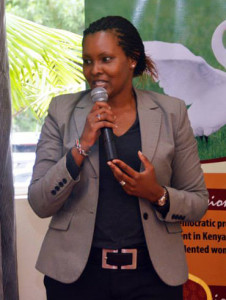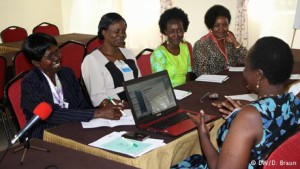
By: David Fellows, John Leonardo [1]
Earlier this year, PFMConnect launched a global survey programme of public sector procurement practice. The first project was in collaboration with the Kenyan Federation of Women Entrepreneur Associations[2] (FEWA). The initiative commenced with questions directed at a group of FEWA members and the results were then compared with evidence gathered by other organisations.
The FEWA responses are summarised in the table below:
|
Yes % |
No % |
Not Sure % |
| Do the laws and court system support fair competition |
10 |
90 |
– |
| Are the laws on purchasing readily available on the internet |
70 |
20 |
10 |
| Are invitations to bid readily available on the internet or in the press |
60 |
20 |
20 |
| Are contract awards adequately announced on the internet or in the press |
50 |
40 |
10 |
| Is the bidding process handled competently |
30 |
70 |
– |
| Does Government get value for money from procurement |
10 |
80 |
10 |
| Is there fairness in the selection of successful tenderers |
10 |
90 |
– |
| Do businesses engage in collusion and bribery |
90 |
10 |
|
| Do you know of criticisms of procurement process in audit reports or public enquiries |
90 |
10 |
– |
| Do you know of complaints by tenderers about the administration of procurement |
100 |
– |
– |
| Do you consider that tenderers are satisfied with how complaints about the awarding of contracts are handled |
10 |
80 |
10 |
| Do you consider that SMEs get reasonable opportunities to win contracts |
30 |
70 |
– |
| Are additional measure required to support women owned businesses despite recent legislation for this purpose |
70 |
30 |
– |
This made it clear that there are serious concerns about the integrity of Government procurement processes with regards to bidding invitations, the awarding of contracts, the handling of complaints, the fairness of the approvals process and failure to prevent collusion between bidders. It would seem that there is discontent within the contractor community about these issues and an awareness that similar concerns are shared by some official bodies. There is also a feeling that the legal measures taken to improve opportunities for women owned businesses are not yet achieving the hope for impact.
FEWA members were asked to suggest improvements to the Government’s approach to purchasing goods and services. Their suggestions included:
- Better access to credit
- Company vetting to weed out collusion
- Fairness in administration
- Transparency including support from a centralised online computer system
Corruption, credit and good administration The recent World Economic Forum Report on African Competitiveness for 2015 deals with some of these issues. It identified the most problematic inhibitors to doing business in Kenya as being:
|
% |
Ranking |
|
|
20 |
Ranked first |
|
|
18 |
Ranked second |
- Inefficient government bureaucracy
|
8 |
Ranked sixth |
These factors, amounting to 44% of the impediments to trade, lend weight to the concerns reflected in our survey. The report suggests a deteriorating situation compared to 2013 when concern for corruption and access to financing stood at 13% and 14% respectively. Overall the report ranks Kenya ninth most competitive amongst African countries, ninetieth worldwide.
Kenya’s ranking in Transparency International’s Corruption Perceptions Index has deteriorated over the last two years with its ranking declining from 139th equal to 145th equal. The Kenya Institute for Public Policy Research and Analysis (KIPPRA) in its 2014 report on the national economy makes the telling point that corruption has a direct impact on poverty levels and the entire quality of life for citizens.
Progress for the disadvantaged As from September 2013 under the provisions of the Public Procurement and Disposal Act 2005, the Kenyan Government directed that a rather ambitious 30% of all government tenders should be awarded to micro and small enterprises (MSEs) owned by women, youth and the disabled and directed that such MSEs should be paid by public sector organisations within 30 Days. Subsequently, prequalification registration stipulations and surety requirements for such groups were simplified and a minimum allocation was set for disabled tenderers with a maximum allocation of 15% to any one of the three groups. Youths were defined as those between the ages of eighteen and thirty-five years. Government has admitted that at present only 3% of procurements are being awarded to preferential groups.
KIPPRA suggests that the Government should allow micro and small enterprise (MSE) associations to organise group bids for public procurement tenders involving MSEs with the Government’s public procurement technical advice service lending support.
Regulation 34 stipulates that payments made under the Act shall be made within thirty days. A circular of the Public procurement Oversight Authority issued earlier this year advised that the main preferment conditions were often being ignored. What hope therefore for the thirty day rule? Prompt payment is essential to mitigate the problems of access to credit identified by disadvantaged groups. It is noteworthy that FEWA has recently taken the initiative of establishing a credit facilitation operation, SACCO, to support its members with professional advice on business funding.
FEWA members also offered two ideas not suggested by KIPPRA. One was the need to simplify tender documentation requirements, at least for smaller contracts; the other was the need to give formal recognition to the role of women’s representative bodies in an engagement process with Government during the introductory phase of the new MSE arrangements. These measures would make a major statement by government about its commitment to MSEs and its support for women in business.
Problems and possibilities The Kenyan Parliament passed a Bill on 27th May 2015 that sets out new enabling legislation for public procurement but the President refused to assent the Bill into law. This Bill has been returned to Parliament for reconsideration but the Parliament has not completed this action. The Bill confirms the role of the Public Procurement Oversight Authority to drive procurement reform and establishes an Administrative Review Board to deal with complaints. It also provides for special arrangements being made in support of disadvantaged groups. There is some concern amongst women’s representative bodies that they may lose the specially defined status they already have because women are not specifically mentioned in the Bill as a necessary component of disadvantage.
The modern world runs on enabling legislation to give governments flexibility to address changing circumstances but the Government and the President will obviously need to give the necessary reassurances of their continued commitment to the support of women-owned businesses. Perhaps they would also hear the calls for the simplification of tendering documentation for smaller contracts, further work on bidding arrangements and strong representation of women within the designated oversight structures.
Kenyan media coverage over the last few months suggests that the implementation of an enhanced procurement regulatory framework will continue to be constrained by corruption. Ambassadors to Kenya have on several recent occasions banded together to warn the Kenyan government and public of the grave dangers posed by the current levels of corruption and have threatened to refuse visas to Kenyan nationals engaged in such practices. Kenyan corruption is widely documented[3] and toxic.
Conclusions Most governments are beginning to regard small business development and the increased prominence of women entrepreneurs as essential contributors to economic diversification and growth. Public sector procurement is clearly an important tool to help facilitate this yet the Government of Kenya has not followed up effectively behind their preferential procurement initiative and needs to do so.
Rampant corruption must also be effectively addressed. We shall return to this and to the subject of procurement administration in a more general context in coming months.
As for the ambitions of women entrepreneurs, their voices are essential to rallying the preferential groups behind the Government’s initiative. We wonder whether they should also demand from Government a clear commitment to a 50% minimum allocation to female-owned MSEs within the preferential allocations to the youth and disability groups.
Postscript
As we write, the Kenyan President has just set out a series of additional measures to combat corruption and has called on religious leaders to support his campaign. The test of the intent will clearly be in the number of prosecutions that flow through the courts and particularly those of high officials and politicians.
[1] The authors David Fellows and John Leonardo are Principals of PFMConnect. They have been engaged on projects in Africa, Asia and the Pacific funded by the World Bank, EU, ADB and DfID.
[2] See: http://fewa.or.ke
[3] Kenya’s corruption problem: causes & consequences, Sr Kempe Ronald Hope; Dfid’s anti-corruption strategy for Kenya ‘13


